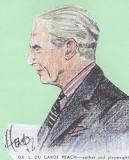This theatre was the brain child of Lawrence du Garde Peach, known as ‘Laurie’.
He was born in 1890 in Sheffield, but brought up in Great Hucklow, Derbyshire, where his father was the pastor of the Unitarian Old Chapel. Educated at Manchester Grammar School, Manchester University and Gottingen University, where he learnt fluent German, and after a spell in the trenches, which included putting on plays with the troops, he spent the rest of WW1 in the Intelligence Corps interrogating German soldiers. He completed his formal education in 1921, with a PhD at Sheffield University in drama.
After a short time in Academia, at what is now Exeter University, he took up full time writing and went back to live in Great Hucklow, where his father was still the pastor, and the population was 90.
He wrote for radio, films, magazines, including ’Punch’, and for theatre. He became editing author for the Ladybird history books, and wrote Toytown scripts for ‘Childrens Hour’ on the BBC, as well as some of the Ladybird books. He did pageants, made cards, painted, and even found time to stand for Parliament as a Liberal candidate for Derby, but unsuccessfully.
His father at this time had set up a holiday home for children in Nissan huts in the village, which Laurie adapted as a theatre, and in 1925 The Village Players were formed, a completely amateur group of villagers, performing in the Nissan hut. There was no power, so plays coincided with the full moon or were lit by oil lamps or batteries that had been borrowed. The first play was ‘The Merchant of Venice’ which ran for 3 nights at 8pm – 1s2d admission, children 6d. Other plays included the ‘Scottish Play’ and ‘Clive of India’. ‘Journeys End was the only WW1 play that was performed. Costumes were hired and the dressing rooms i.e.the wings, were outside, which was alright, in the right weather and there was no snow.
The amateur village actors were invited to act, and if there was no new script for you for the next play after your performance, you knew you were not wanted in further plays.
This continued until 1937, when a new minister was appointed and the Nissan huts were required for another use.
So a barn adjacent to the remains of the village lead mine was purchased, with the help of a ’loan’ (which was never repaid) from the Sheffield industrialist J.G.Graves, and converted into a proscenium theatre with an auditorium of 250 seats (acquired from Montgomery Hall at 6d each) on a slope. In 1938, they moved in.
The first play was ‘Shells’ about WW1, and was written by Laurie. The next play was ‘Mrs. Grundy comes to Tea’, but in 1939 and during WW2, the theatre closed and the actors joined the Home Guard. The theatre was used as a club for children.
Recommencing after the war, performances were always full. There were 3 plays per year with 3 weeks rehearsal and 3 weeks performances on 6 days /week + 3 matinees i.e. 21 performances. The list of plays performed was ambitious and varied.
4 local men did the stage settings, which were always professional.
Lauries wife was the prompt and sometimes fell asleep. Programmes were free.
Refreshments at half time were supplied by a mobile van, nicknamed ‘The Desert Rat’, apparently not to be recommended.
There were sometimes complaints that there were too many plays written by Laurie, so he wrote one under an assumed name, with a glowing description of this person, which was of course him.
In 1954 Laurie wrote a play on village life and even wrote plays around village characters.
In fact he did nearly everything, including writing Newsletters which were highly amusing. Audiences came from all over the world and famous actors performed there. Edna Raiworth, the grandmother of Sophie Raiworth of telly fame, was first lady in many plays there.
By 1971, Lauries wife was not well, and despite being encouraged to continue, Laurie said ‘When you’ve finished with a toy, you throw it away’. The theatre was sold to the Sheffield Scout Association with the condition that it should never be used for performances again.
‘To the Manor Born’ was the last play and everyone involved received a letter of thanks for their contributions.
Lawrence du Garde Peach died in 1974.
There is a plaque on the side of the barn where the action took place.
A small tribute to a remarkable achievement, by a remarkable man who gave so much pleasure to so many, especially in Great Hucklow.
An excellent mornings talk.

